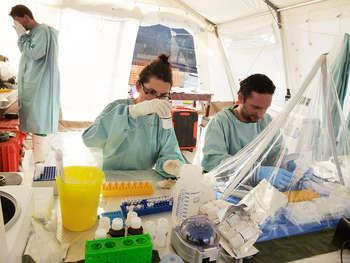Health - European Medical Corps to respond to emergencies
The European Medical Corps provide medical assistance and public health expertise in response to emergencies inside and outside the EU.

> EDD - a forum for international development and cooperation
> EU - Civil Protection Mechanism, Work programme 2016
EU response to Ebola crisis
The Ebola crisis in West Africa has shown the acute shortage of trained medical teams ready for deployment for health emergency response.
As a risult, Germany and France in late 2014 proposed a "White Helmets" initiative, which laid the foundation of the European Medical Corps (EMC), through which teams and equipment from the EU Member States can be rapidly deployed to provide medical assistance and public health expertise in response to emergencies inside and outside the EU.
> EU – call Health 2015, results
The official launch of the European Medical Corps took place on 15 February 2016 at the European Commission's Berlaymont building, at the presence of EU Commissioners for Health and Food Safety Vytenis Andriukaitis and for Humanitarian Aid and Civil Protection Christos Stylianides.
"The aim of the European Medical Corps is to create a much faster and more efficient EU response to health crises when they occur", said Commissioner Christos Stylianides who hosted the high-level inauguration event in Brussels. "We need to learn the lessons from the Ebola response; a key difficulty was mobilising medical teams. I thank all the Member States that have already contributed so far, and encourage others to join so the EU's response will be able to meet increasing needs and will allow for better planning and preparation before any disaster."
The European Medical Corps: how it works
Carried out in close cooperation with the World Health Organization (WHO), the EMC is part of the European Emergency Response Capacity, which is a voluntary pool established under the EU Civil Protection Mechanism (EUCPM) and financed by Member States.
Once committed by the EU Member States, to be part of the European Medical Corps, the teams need to undergo a certification process to make sure that they meet the quality criteria and that they are trained to work within the international coordination framework.
The teams benefit from EU support through different grants' types:
- adaptation grants for upgrading the teams to an enhanced status of readiness, quality and availability are available. The amount is up to 100% financing from the EU budget.
- grants for activities related to the certification of teams, including training, exercises and workshops. They can also be fully supported by the EU.
- transport grants for deployments of the teams to emergencies of up to 85%.
> EIB – 61 new loans approved in Europe, Africa and Asia
The EMC will include:
- emergency medical and public health teams,
- mobile biosafety laboratories,
- medical evacuation capacities,
- medical assessment and coordination experts
- logistical support teams.
The deployment of the medical teams is coordinated by the European Commission’s Emergency Response Coordination Centre (ERCC) of the EU Civil Protection Mechanism. Member States retain the final decision on deployment and can opt out of a mission if necessary. In the field, the teams will be coordinated through the coordination platform set up for the concrete emergency on the ground, managed by the relevant authorities of affected State or under the UN coordination system.
> Innovative Medicines Initiative - IMI 2, upcoming calls
By January 2016, nine Member States have already offered teams and equipment to the European Medical Corps: Belgium, Czech Republic, Finland, France, Germany, Luxembourg, Netherlands, Spain, Sweden.
Photo credit: EU Humanitarian Aid and Civil Protection / Foter / CC BY-ND




